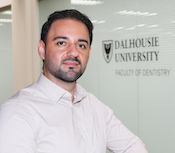The Government of Canada announced $34.4 million in funding Wednesday (March 13) to propel Dalhousie University research in battery science, heart health, ocean ecosystems and much more. Funding was also announced to support new Canada Research Chairs at the university who will study biomaterials to ease the pain of osteoarthritis and other ailments, decarbonization of agriculture, and new approaches to ensure the safety of our drinking water.
āImportant investments made through federal research grant programs announced today will help us deliver tangible solutions to challenges faced by Nova Scotians and people across Canada,ā said Dr. Alice Aiken, Dalhousieās vice president research and innovation. āWhat causes a heart to fail? How can we build a sustainable energy future with batteries and biofuels? How can we safeguard our ocean and the creatures that call it home? With this support from our federal partners, our scholars will supply answers to these pressing questions and many more.ā
The funding announcement was made by the Honourable Pablo Rodriguez, Minister of transport, at lāUniversitĆ© de MontrĆ©al on behalf of the Honourable FranƧois-Philippe Champagne, Minister of Innovation, Science and Industry, and the Honourable Mark Holland, Minister of Health. It included grants provided through the Canadian Foundation for Innovation (CFI), Natural Sciences and Engineering Research Council of Canada (NSERC), Social Sciences and Humanities Research Council (SSHRC), and the Tri-agency Institutional Programs Secretariat (TIPS).Ģż
Support from CFI
CFI grants announced today for Dal research total almost $10.3 million and provide investments in infrastructure that will support fundamental and applied science, and technology development. The grants will contribute to:
Building the future of batteries
Drs. Michael Metzger and Chongyin Yang, Faculty of Science
Ģż
 Dalhousie will receive a $5-million grant to support the creation of a first-in-Canada university-based battery prototyping and production facility. The $20-million Canadian Battery Innovation Centre, targeted to open in Fall 2025, will provide an ultra-low humidity environment with a high-end manufacturing line for the creation and testing of new batteries. The facility will be a gamechanger for Dalhousieās world leading battery researchers who currently send designs for new batteries they want to study to third parties for manufacture.
Dalhousie will receive a $5-million grant to support the creation of a first-in-Canada university-based battery prototyping and production facility. The $20-million Canadian Battery Innovation Centre, targeted to open in Fall 2025, will provide an ultra-low humidity environment with a high-end manufacturing line for the creation and testing of new batteries. The facility will be a gamechanger for Dalhousieās world leading battery researchers who currently send designs for new batteries they want to study to third parties for manufacture.
Learn more about the Canadian Battery Innovation Centre.
Exploring the cause of heart failure
Drs. and , Faculty of Medicine
Ģż
CFI will provide $2.9-million, matched by $2.3-million from Research Nova Scotia, to fund research focused on a newly diagnosed and little-understood multi-organ syndrome that causes half of all heart failures. The funding will provide cutting-edge equipment at Dalhousie Medicine New Brunswick in Saint John and in the Faculty of Medicine in Halifax to investigate the syndrome, promote commercialization of discoveries, and improve the quality of life for heart failure patients.
 Ģż
Ģż
Sustaining ocean environments
Drs. and Rob Lennox, Faculty of Science
Ģż
A further $2-million CFI grant, secured by ocean researcher and former scientific director of the (OTN), Dr. Sara Iverson, will support the Dalhousie-based organization in its work to upgrade and replace acoustic tracking infrastructure that monitors animals in ocean and freshwater environments. Led by scientific director Dr. Robert Lennox and executive director Dr. Fred Whoriskey, OTN is a global aquatic research, data management and partnership platform focused on the conservation and management of aquatic animals by providing knowledge on their movements, habitats and survival in the context of changing global environments.
Dalhousie researchers will also receive CFI Innovation Fund support for their contributions to research programs at partner universities focused on geothermal energy, water cycles in Eastern Canada, and aerial robotic manipulation.
 Ģż
Ģż
NSERC Alliance Grants
Ģż
foster partnerships between university researchers and stakeholders across the private, public, and non-profit sectors in Canada and around the world. By funding collaboration beyond academia, these grants aim to advance translation of findings into tangible societal benefits. Funding for the 2022 competition year announced today totals $10.3 million for 29 Dal research programs, including:
Decarbonizing Canada's food supply chain
Dr. Gordon Price, Faculty of Agriculture
Ģż
 This project, funded by a $1.4-million grant, seeks to comprehensively assess greenhouse gas emissions from food wastes occurring across the food value chain and offer innovative mitigation strategies tested with industry partners. With the aim of informing policy and action, the project will identify opportunities to make substantial and lasting impact toward mitigating climate change. Outcomes are expected to shape policy, consumer behaviour, and strategies in a wide range of industries.
This project, funded by a $1.4-million grant, seeks to comprehensively assess greenhouse gas emissions from food wastes occurring across the food value chain and offer innovative mitigation strategies tested with industry partners. With the aim of informing policy and action, the project will identify opportunities to make substantial and lasting impact toward mitigating climate change. Outcomes are expected to shape policy, consumer behaviour, and strategies in a wide range of industries.
SSHRC Insight Development Grants
Insight Development Grants are geared to help researchers explore the development of new research questions, methods, and theoretical approaches. Funding for the 2023 competition year announced today totals $512,280 for eight Dal research studies, including:
Understanding the ethics of fraudulent product returns
Drs. Jing Chen and Bo Yu, Faculty of Management
Retailer return policies, intended to foster customer loyalty, face challenges from fraudulent returns. Customers exploiting lax policies reportedly constituted 10.6 per cent of all returns in 2020. The study by Dr. Chen and Yu, funded by a $73,000 grant, will investigate how customers' ethical judgment of unethical returns influences their perceptions of actions in return policies deterring fraud and future purchasing intentions. They will explore strategies to mitigate fraudulent returns and foster positive consumer behaviour.
 Ģż
Ģż
Canada Research Chairs (CRC)
Selected for their potential to make a positive impact in the world, CRCs are established and emerging leaders, pushing scholarship forward in areas critically important to improving our quality of life and Canadaās international competitiveness. Dalhousie currently has 56 CRCs spanning nearly every field of study.
Dr. Vahid Adibnia, Faculty of Dentistry
Tier 2 CRC in Functional Polymeric Biomaterials
 Dr. Adibnia is focused on improving the health and well-being of patients affected by various medical conditions, including osteoarthritis, implant-induced infections, and severe surgical bleeding. In collaboration with clinicians and hospital research centres, he works to translate biomaterials designed in his laboratory into products that patients can readily access to improve their health.
Dr. Adibnia is focused on improving the health and well-being of patients affected by various medical conditions, including osteoarthritis, implant-induced infections, and severe surgical bleeding. In collaboration with clinicians and hospital research centres, he works to translate biomaterials designed in his laboratory into products that patients can readily access to improve their health.
Ģż
Dr. Sonil Nanda, Faculty of Agriculture
Tier 2 CRC in Clean Agricultural Technology and Energy
 Dr. Nanda's research program aims to demonstrate how advanced thermochemical, hydrothermal, and biological methods can be used to convert the by-products of agriculture and forestry into high-value biofuels. By creating this circular economy, his work promises to develop scalable and commercially viable solutions for clean energy and decarbonization that leverage currently available infrastructures for fuel production and distribution.
Dr. Nanda's research program aims to demonstrate how advanced thermochemical, hydrothermal, and biological methods can be used to convert the by-products of agriculture and forestry into high-value biofuels. By creating this circular economy, his work promises to develop scalable and commercially viable solutions for clean energy and decarbonization that leverage currently available infrastructures for fuel production and distribution.
Ģż
Dr. Amina Stoddart, Faculty of Engineering
Tier 2 CRC Chair in Wastewater Treatment Technology and Surveillance
 Dr. Stoddartās research program aims to enhance the sustainability of wastewater treatment in Canada by developing tools for process assessment, advancing treatment strategies, and establishing new approaches to environmental surveillance. She aims to address challenges posed by aging infrastructure, climate change, energy costs, and evolving regulations to protect public and environmental health.
Dr. Stoddartās research program aims to enhance the sustainability of wastewater treatment in Canada by developing tools for process assessment, advancing treatment strategies, and establishing new approaches to environmental surveillance. She aims to address challenges posed by aging infrastructure, climate change, energy costs, and evolving regulations to protect public and environmental health.
Ģż
Ģż
Dr. Catherine Mah, Faculty of Health
Tier 2 CRC in Promoting Healthy Populations (Renewed)
Ģż
 Poor diet is a leading preventable risk factor for the global burden of disease. Dr. Mahās research program deepens our understanding of the environmental and policy determinants of diet and consumption, with a focus on food access and affordability. Her work aims to strengthen public policy approaches to promote health and social equity.
Poor diet is a leading preventable risk factor for the global burden of disease. Dr. Mahās research program deepens our understanding of the environmental and policy determinants of diet and consumption, with a focus on food access and affordability. Her work aims to strengthen public policy approaches to promote health and social equity.
Ģż
Also announced today was a key investment of nearly $10.5-millionĢż through the Research Support Fund, to support Dalhousie and affiliated health research institutes and research hospitals, with the indirect costs associated with federally funded research, including research security.

